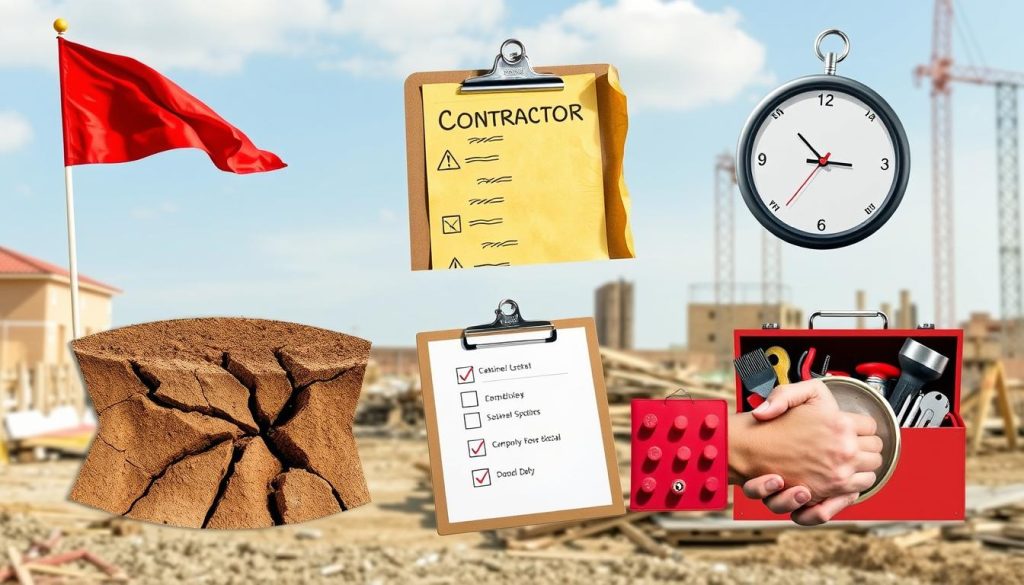About 30% of homeowners report bad experiences with contractors. This fact shows why being careful is key when choosing one. Home improvement projects are important. They can either go very well or become a real headache. The difference? Knowing the warning signs when hiring a contractor.
We understand how much a good contractor matters for your project. It affects quality, time, and budget. But, many contractors offer low bids that are misleading. This often leaves homeowners with unfinished projects and extra costs.
Experts in the industry have helped us identify signs of a bad contractor. Knowing these signs helps you make smart choices. It also keeps your money safe and prevents stress. Doing your homework before hiring a contractor saves you from trouble and extra expenses.
Key Takeaways
- Recognize common contractor red flags for informed decision-making.
- Avoid contractors who ask for excessive upfront payments.
- Seek transparency in pricing to prevent budget overruns.
- Trustworthy contractors provide written estimates and are licensed.
- Monitor online reviews to gauge contractor reputation and past performance.
- Effective communication is vital for successful contractor relationships.
- Verify contractor claims through testimonials and portfolios.
Inconsistent Communication Patterns
It’s key to communicate well when working with a contractor. If the contractor doesn’t communicate consistently, your renovation may face problems. Keep an eye out for signs like irregular communication. This can show through late replies or messy meeting schedules.
These signs might mean bigger issues that could delay the project. And affect how well the work is done.
Signs of Disorganization
There are specific red flags to be aware of with contractors. Being disorganized is a big one. For example, look out for:
- Frequent changes to scheduled meetings or calls.
- Delayed responses to emails or messages.
- Lack of clear communication about what to expect from the project.
If a contractor shows these signs, the project might get frustrating. Assess how they handle your initial questions. This will show what working with them might be like.
The Importance of Timely Responses
Getting replies on time is crucial when working with contractors. Constant delays can hint at deeper problems. This could cause big challenges later on.
Finding a contractor who replies quickly can make the project go smoother. Everyone stays on the same page. Knowing how to keep communication clear is important.
It helps make the renovation process better for everyone. Understanding these points can make a big difference in your experience.
For a better project experience, look at guides like this one. They give great tips on working with contractors.
Lack of Licensing and Insurance
Starting a renovation project requires careful selection of your contractor. It’s important to check their license and insurance. These are basic but crucial steps. Not having insurance can lead to a lot of problems for you as a homeowner.
Why Verification Matters
Checking if a contractor is licensed confirms their professionalism. It also shows they are accountable. In Connecticut, for instance, you can check a contractor’s license online. This step helps avoid issues with contractors who might not be reliable. Some homeowners have had bad experiences. They’ve dealt with contractors who did not complete the work or charged too much for poor work.
Risks of Hiring Unlicensed Contractors
Hiring someone without a license is risky. These risks include not being protected and getting bad quality work. Work done without permits can also result in fines and trouble when selling your property. It could even make your insurance cost more, or lead to claims being denied. Knowing these risks helps you plan better for your home improvement.

| Issue | Risk | Solution |
|---|---|---|
| Lack of Contractor License | Legal ramifications and poor workmanship | Verify licenses via state websites |
| Lack of Insurance | Financial liability for damages or injuries | Request proof of general liability and workers’ compensation insurance |
| Unpermitted Work | Fines and complications in property sales | Ensure all work is permitted and meets local codes |
Keeping these important points in mind helps pick a good contractor. By doing your homework, you can make your renovation go smoothly.
Poor Online Reviews and Ratings
When you’re hiring a contractor, checking their online reputation is key. Poor reviews can signal big issues. Doing thorough online research is vital. It helps us find warning signs and avoid mistakes.
How to Research Contractor Reputation
For a good result, it’s important to thoroughly check a contractor’s reviews on different sites. Look for recurring issues in the feedback, especially these points:
- Multiple negative reviews pointing to bigger problems.
- A lack of reviews might mean they’re inexperienced or unreliable.
- How they respond to feedback shows if they’re eager to improve.
Experts say contractors should give references from past clients. You should expect at least one or two strong references. Getting this info helps us know more about the contractor. It also keeps us safe from frauds hiding their bad track records.
Red Flags in Customer Feedback
Some warning signs require extra attention towards a contractor’s behavior. Watch out for:
- Many bad reviews, which is a big concern if there are few good ones.
- Frequent issues with timelines and responsibility.
- Contractors not explaining or solving the issues in their negative reviews.
Focusing on these points can reveal important warnings, like failing to meet project goals. For more on avoiding bad contractors, check this resource.
Unclear or Unwritten Estimates
Getting a detailed estimate is crucial for home improvement projects. Professional quotes ensure clarity and set expectations between homeowners and contractors. Being cautious with vague contractor estimates is important. They can cause misunderstandings and extra costs later on. It’s smart to check if the estimate includes all costs, timelines, and work details. Without these details, we might see unexpected changes when initial plans prove wrong.
What to Expect in a Professional Quote
A pro contractor should give a detailed written estimate for the project. It should list:
- Labor costs
- Material costs
- Project timelines
- Payment schedules
- Warranties and guarantees
If a quote isn’t clear, it’s a warning sign about hiring that contractor. It shows a problem with their responsibility. Often, homeowners pick the cheapest option, overlooking the need for clear agreements.
The Dangers of Verbal Agreements
Only relying on spoken agreements is risky. Verbal agreements can cause disputes and confusion about the project. A signed document covers all important details, protecting everyone involved. Beware of contractors who want deals not written down. This can lead to unexpected costs and disagreements.
Finding the right contractor is vital. We can avoid problems by researching, asking for written estimates, and getting everything in writing. For tips on hiring contractors without running into troubles, read this article.
Abrupt Changes in Scope or Terms
We must always be on the lookout for sudden changes in terms when hiring a contractor. These changes could mean there are deeper problems, or even that someone is trying to scam us. If a contractor often changes what the project is about or adds new rules without a clear reason, that’s a red flag.
This could mean they are trying to overcharge us. Or, it might show that their business isn’t doing well. It’s important to see these changes as big warning signs when hiring someone.
Signs of a Potential Scam
It’s key to keep track of all talks and changes during the project. If a contractor tries to change the agreement while work is going on, check our contract. This helps protect us from contractors that can’t be trusted.
Knowing what scams look like helps us protect our interests. It makes us ready to take action if needed.
How to Address Contractual Changes
If contractors don’t work with us on sudden changes, we may need legal advice. Sometimes, ending the contract is the smartest move. Making sure everything is clear and open in our agreements keeps our money safe and makes the project go smoothly.
Thinking about these steps, let’s also look at guides on contractor hiring warning signs. These guides can give us more knowledge and help us make better choices.
FAQ
What are the common red flags when hiring a contractor?
Some flags include unclear talking, no license, and bad reviews online. Also, watch out for vague price guesses and sudden plan changes. These hints help us dodge bad contractors.
How can inconsistent communication indicate a potential issue with a contractor?
If a contractor replies late or sets messy meetings, it shows they’re not organized. This makes the job frustrating and tells us to be careful when picking a contractor.
Why is it important to verify a contractor’s licensing and insurance?
Checking for a license and insurance protects our money from unexpected problems. Licensed contractors are up to standard. Insurance covers us if something goes wrong during the fixing.
What can poor online reviews tell us about a contractor?
Bad reviews often point to low-quality work or poor service. A lot of unhappy customers means the contractor might not live up to what we need.
What should a professional estimate include?
It should give clear cost details, timelines, and what’s included in the job. Clear, written quotes help avoid any confusion and make sure everyone agrees before starting.
What should I do if a contractor frequently changes the terms of our agreement?
When a contractor suddenly wants to alter the deal, write everything down and look at the signed contract. We might need to talk it out or end the contract to keep our project safe.
Source Links
- https://lamontbros.com/problems/contractor-red-flags/
- https://gtexgc.com/f/red-flags-to-watch-out-for-when-hiring-a-general-contractor
- https://pacesga.com/blog/red-flags-when-hiring-a-contractor/
- https://aligndecking.ca/blog/7-red-flags-of-bad-deck-builders
- https://rumahhq.com/how-to-spot-a-shady-contractor-from-a-mile-away-dont-get-scammed/
- https://trustroofing.com/blog/5-questions-to-ask-your-contractors-before-you-hire/
- https://finehomecontracting.com/biggest-red-flags-to-look-out-for-when-hiring-a-contractor/
- https://www.havardcooper.com/articles/red-flags-when-hiring-contractor
- https://landobuilderscorp.com/red-flags-to-watch-out-for-when-hiring-a-general-contractor/
- https://systempavers.com/blog/top-10-red-flags-to-watch-out-for
- https://remodart.com/10-tips-on-hiring-the-best-remodeling-contractor/
- https://ultimatecontractorscorp.com/construction/how-to-properly-vet-your-construction-contractor/
- https://thekitchenconsult.com/what-are-the-warning-signs-to-look-for-when-hiring-a-contractor/
- https://procrewschedule.com/red-flags-you-should-be-aware-upon-hiring-a-contractor/
- https://finehomecontracting.com/10-types-of-scam-contractors-to-avoid/


